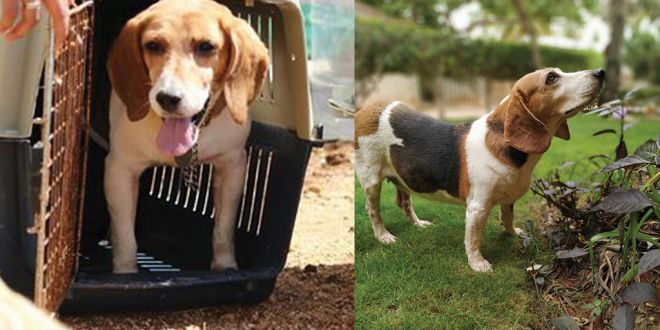It was legal to test cosmetics on animals in India until 2013. After a sustained push for years by animal welfare NGOs, India rolled out a series of rules and regulations that effectively outlawed the testing of cosmetics and its ingredients on animals, then the import of animal-tested cosmetics, and then repeat testing of drugs, making it the first South Asian country to do so.
In 2015 the Committee for the Purpose of Control and Supervision of Experiments on Animals (CPCSEA) released guidelines that doubled down on the reuse of dogs in toxicity studies, stipulating that they could only be used for a maximum period of three years (or earlier, if the dog falls extremely ill), after which it should be rehomed with the help of an animal welfare organisation.
What then started happening was that laboratories either shut shop or were forced to release the beagles in their “care”, en masse.
After being born and raised in laboratories, likely being shocked, poisoned, isolated and severely traumatised, hundreds of beagles suddenly saw the world for the first time in Bengaluru in 2015. The task of overseeing the rehabilitation and rehoming of about 242—the largest number to be released from a lab anywhere in the world—fell into the capable hands of volunteers at Compassion Unlimited Plus Action (CUPA), who later formed Freagles of India, a registered trust that continues this work to date.
The idea of a creature with a rich emotional life, as intelligent, as capable, and as loving as a beagle, being subjected to such “organised maltreatment” (as one adopter puts it), raised in a lab that quashes and suffocates its potential, and then released, creates a heartbreaking image. Thinking of a beagle, with a number for a name, peering out of its stackable crate for the first time, clinging to it, then staggering out anxiously before breaking into a run fills me with a rush of tenderness, of guilt on behalf of fellow humans, and the compelling desire to right a wrong, to love it and show it what life could be out here.
But to adopt one is not so easy. One has to fill out a form and go through a selection process including rigorous counselling. “During our counselling process, we set expectations right with these families about what they’re taking home,” says Chinthana Gopinath, founder trustee of Freagles of India. “Many people think that a beagle who has been in a cage will want to appreciate freedom and you know, want to go to a park and want to go swimming and want to go have ice cream in an ice cream parlour. But we reset these expectations because that’s not the case.”
“With a regular dog, you go from zero to five. But I’m starting with a dog from minus five,” says Christopher Franklin, a trainer who has worked closely with lab-released beagles. “These dogs are not exposed to our kind of environment, to the outdoors, to vehicles. They’re used to a laboratory. As they make the transit from lab to household, they have to be gradually introduced to everything—from the ladles in your kitchen, to a plate, your television’s noise, the traffic outside, to birds chirping, to trees, to plants, to the wind moving leaves.”
But Gopinath emphasises that no matter how traumatised the dogs may seem when they’re released, they all have the potential to blossom into happy, confident, loving, lovable dogs. “You don’t have to be an experienced pet-owner to adopt a Freagle though,” she says. “Just gentle to a fault and ready to adjust your own expectations and behaviour to support it through the transition. The challenge is always to find families and human beings who are committed to the process of helping these dogs do the turnaround, not have pity for them, but have respect for them and have the patience to stand by them as equal partners and help them rehabilitate. So the challenge is always the human angle—it’s never the dogs.”
VICE got in touch with a few adopters to find out what it took them to learn to live with and love a lab-rescued beagle.
“Freagles are such a happy lot. When they come out, they’re like, ‘The whole world is my oyster! Let me see what I can get into!’ Sora is 15 and you always think of older dogs as lethargic and sleepy but it depends on the kind of environment that you bring them into. I keep telling Chinthana, ‘You didn’t give me an old lady! You gave me a pup!’ She loves her toys—especially my socks. Every single pair of my socks has gone missing. I buy her socks for her birthdays and she runs around with a sock in her mouth, very happy with herself. I call her my ray of sunshine and my bunny because she’s always hopping around the house. She loves moving and jumping around.
If you’re adopting a dog from a certain organisation or people, always pay attention to their advice because they have knowledge about its personality and its quirks. That, and of course—consult a properly qualified trainer if necessary. Someone who understands the breed, the dog’s specific background and gives the dog’s personality priority over their own training methods.”
“Freagles are not damaged, but they are affected by their background, so they need space to come out of their shell. Human beings are not creatures who have given them a good time or good treatment. They don’t know compassionate touch at all, so it takes them a while to get used to that, to get comfortable. But that is par for the course. It’s like having a child who is specially-abled. You have to give them space to develop themselves.
Oscar has an enlarged heart, but that’s a common thing among freagles. When he first arrived, he didn’t know how to chew food. He only knew how to chew pellets. He didn’t know what curd was; he didn’t know what chicken was. He would sniff and walk away because it’s not something he was used to.
Some dogs are okay in a week’s time. Others are not okay in maybe even six months or a year, and my Xoru is not fully with (my other pets), even now after three years. He’s still very shy and not very outgoing. In the third year, he started coming out to greet us when (we’d come) home. Earlier he would just hide and watch guests coming in. Now he comes out and greets guests. I just leave him alone. He loves to eat. He loves to go for a walk. So we pull the leash and he’s out, ready and you know, tail (wagging) full speed. But it’s been a long haul. It will be four years in September, but I’m fine with that. I’m happy as long as they are healthy and happy with me.”
“We were initially thinking, ‘Oh my God, we’re both working, how will the dog manage?’ But then when I read more, I saw that they (lab-rescued pets) love affection but at the same time, they’re independent. I felt like this is the perfect blend. It may take some time but I feel that the bond is a bit stronger because you’re giving them that space and they know that you are not going to force yourself on them or anything like that.
We don’t treat Odin like a baby or a dog who is helpless, we don’t invade his space. We behave like he’s always been with us, like he’s always been a part of the family.
People think that because they’ve been tested in laboratories, they’ll be bedridden, or always on medication. That’s the biggest misconception. Odin is so playful and active despite being eight, that when I’ve got friends coming over, they won’t even know he’s a lab-rescued beagle till I tell them.”
Please Note: This article is not edited by DogExpress Team!
 DogExpress
DogExpress

















 in Chandigarh, India.
in Chandigarh, India. 

